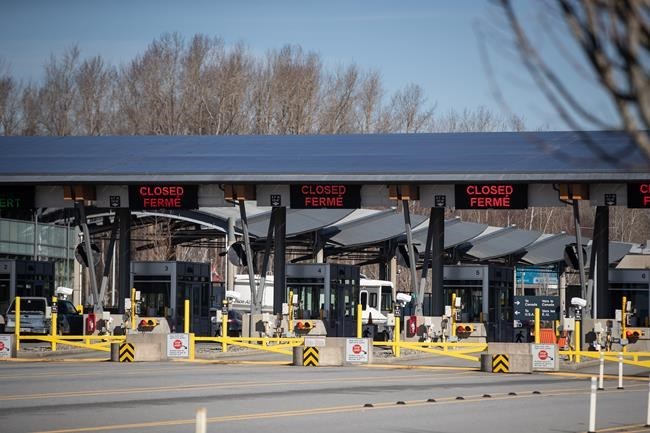WASHINGTON — Canada and the United States are expected to close their doors to discretionary cross-border travel sometime overnight Friday, leaving it open to long-haul truckers, air crews, cross-border health care personnel and others designated as "essential" to maintain vital health and supply lines between the two countries.
For those whose livelihood depends on cross-border commerce, there is as much concern about the fragility of the accord as there is relief that it exists at all.
"This is not a matter that should be left to individual customs and border patrol agents at individual ports of entry to try to interpret themselves," said Scotty Greenwood, chief executive of the Canadian American Business Council, whose organization has been seized in recent days with finding solutions to the logistical challenges a partial border closure presents.
"If you've got a tractor-trailer full of supplies, that's an easy call. If you're a nurse or a first responder, you know — no brainer. The question is, what about everybody else, and how is that going to be dealt with?"
The fine print was still being worked out Thursday, but the closure — a mutual agreement aimed at restricting the spread of COVID-19 without choking off trade routes and commercial channels — would likely go into effect as the weekend begins, Prime Minister Justin Trudeau told a news conference in Ottawa.
"We are continuing to work on the fine-tuning of the agreement between Canada and the United States, I think it's almost there," Trudeau said. "My understanding is that the measures will probably come into place in the night between Friday and Saturday, so in about a day and a half."
Essential cross-border workers like health-care professionals, airline crews and others will be permitted to cross, but neither the federal government nor the White House have detailed precisely how those who can get through will be defined.
"Essential border crossings will not be impeded," said Deputy Prime Minister Chrystia Freeland. "Trade between our two countries will not be impeded."
Greenwood said her members are focused on figuring out precisely how the two governments intend to define "essential," and whether existing so-called "trusted traveller" mechanisms like TSA Pre-Check, Global Entry, NEXUS and the like can provide a logistical model.
"Government actually knows how to screen and certify people," she said.
"Is there a way in which you could get a certification quickly from government that essentially says, 'We certify that you're an essential business traveller,' so that at least in those instances you would have some level of confidence that you could go back and forth across to carry out essential business."
Given that so much is still in flux, the consequences of a border closure could end up dwarfing those that ensued in the days following 9/11, said Bill Anderson, director of the Cross-Border Institute at the University of Windsor.
"This one is something that could be in place for weeks, if not months," Anderson said, noting that truck traffic through the Windsor-Detroit corridor had grown heavy in recent days as businesses began to anticipate restrictions on crossing the border.
"In a sense, this is a much bigger deal."
Depending how long the travel restrictions are in place, it could have a lasting impact on the economies in Windsor and Detroit, which are inextricably bound together and dependent on the flow of people and money in both directions, he added.
"Right now, everybody's life has changed so much that this is just sort of one more thing, and not necessarily the most problematic thing. The thing that worries me is, can we get this border back to normal as soon as there's — I don't know what an 'end' looks like, but a reasonable tamping down of the risks."
Freeland reiterated Thursday that any Canadians still in the U.S. will be able to return to Canada. "All Canadians have the right to come home," she said. However, she added: "This is not the time to engage in non-essential travel."
The U.S. State Department was even more blunt Thursday, issuing a Level 4 "Do Not Travel" advisory urging Americans not to leave the country.
"If you choose to travel internationally, your travel plans may be severely disrupted," the advisory said, "and you may be forced to remain outside of the United States for an indefinite time frame."
The Canadian Trucking Alliance and its American counterpart issued a joint plea Thursday to both countries to ensure commercial truck rest areas remain open across both countries as truck drivers ply North America's highways, keeping supply chains moving and store shelves stocked with supplies that grow scarcer by the day.
"We need to help our nation's drivers more than ever — truck drivers will play a key role in fighting COVID-19," said CTA president Stephen Laskowski.
"Shutting down the very few safe places they can rest, shower, fuel up and eat is not something anyone wants and will eventually disrupt the delivery of essential goods Canadians and Americans desperately need right now."
This report by The Canadian Press was first published March 19, 2020.
The Canadian Press



